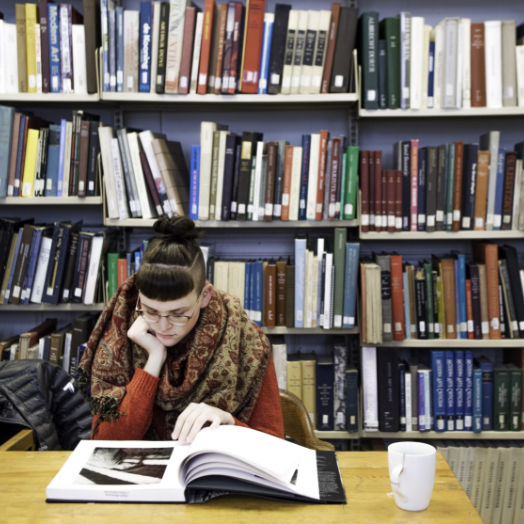BA, Art History
(Non-Studio)
NSCAD was the first Canadian degree-granting institution to offer a degree in art history. Decades later, the Art History and Contemporary Culture Division is still on the cutting edge of conceptual art criticism and practice.
Enhanced by its setting within an art school, the Bachelor of Arts, Major in Art History program enables students to take studio courses while concentrating on a variety of critical discourses surrounding the production and reception of art.
Division: Art History and Contemporary
Culture/Foundation
Degree: Bachelor of Arts
Program: Major in Art History (Non-Studio)
Program Length: 4 years (see Degree Requirements)
Campus: Fountain Campus
Admission Deadline: March 1 for September; October 1 for January

Majors immerse themselves critically and reflectively in histories of art, craft and design; courses in art, craft and social theory also help to sharpen students’ critical capacities. As a part of this major, students may also take courses in critical studies with a focus on material culture, the environment, gender theory and community art practices. At the same time, students can take studio classes in an environment that is intensely focused on art-making.
Graduates of NSCAD University’s art history major are regularly accepted into graduate programs in art history and other professional degrees; they may go on to become art teachers in primary and secondary school and art history faculty in colleges and universities, as well as curators, critics, editors, appraisers, archivists, art therapists, conservationists and community practitioners.
Our Art History (Non-Studio) Students can Expect
– Enhanced by its setting within an art school, students in the Bachelor of Arts, Major in Art History program are surrounded by ongoing contact with various modes and materials of current maker, exhibition and critical practices in the arts, craft and design.
– With a strong emphasis on theory, students are offered courses in art history, literature, film history and theory, art education, critical studies and Indigenous studies. Ranging from introductory surveys to senior seminars, these courses bring students together, fostering a cross-disciplinary flow of ideas and interaction.
– The ability to work closely with a faculty comprised of accomplished artists, scholars, educators and leaders in their craft.
Featured Courses
Art of Recrafting
Failure
Art of Recrafting Failure: This course engages with theoretical and critical analyses of failure that trouble the triumphant narrative of art and craft’s historical canon. The course foregrounds failure as generative and imperative to creative practice, and provides students with an opportunity to engage with concepts of failure toward building personal resilience.
Treaty Relations and Art Practice
Treaty Relations and Art Practice: This course investigates historic and contemporary treaties in relation to Indigenous sovereignty and settler colonialism in Mi’kma’ki and throughout the Canadian and global colonial landscape. Students will explore treaty principles, Indigenous nationhood and sovereignty, settler responsibility as well as treaty based arts practices. A key concept to be considered is: What does it mean to be Treaty People?
The Visual Culture of Slavery
The Visual Culture of Slavery: Drawing upon art historical and other literature, this course seeks to explore the role of art and visual culture in Transatlantic Slavery. This course will also explore the nature of the colonial archive, its role in the dehumanization of black Africans, and the subsequent problems in the recuperation of the lives, perspectives and thoughts of the enslaved through documents that were almost uniformly created by slave owners and their surrogates.
Unsettling Canadian Art History
This course explores the production of art in the context of Canada in relation to settler colonialism, Indigenous sovereignties and diasporas. Grounded in theoretical discourses of decolonization, anti-racism and equity studies, students will consider a range of historic and contemporary art and craft practices. Drawing from current scholarship in art history, Indigenous Studies, Black Studies, gender studies (to include feminisms), diaspora studies and Canadian studies key questions to be interrogated include: What constitutes Canadian art and how might we re-imagine and unsettle the writing of Canadian art history?
Please visit the Academic Calendar for a description of all courses available during your undergraduate studies.
